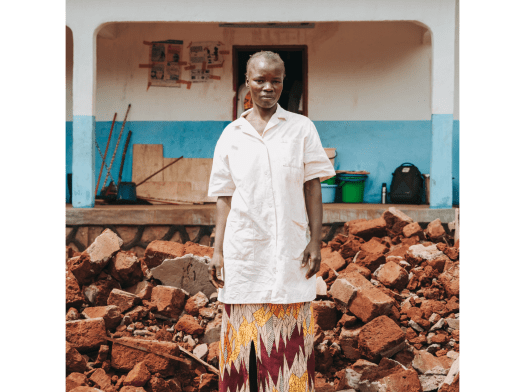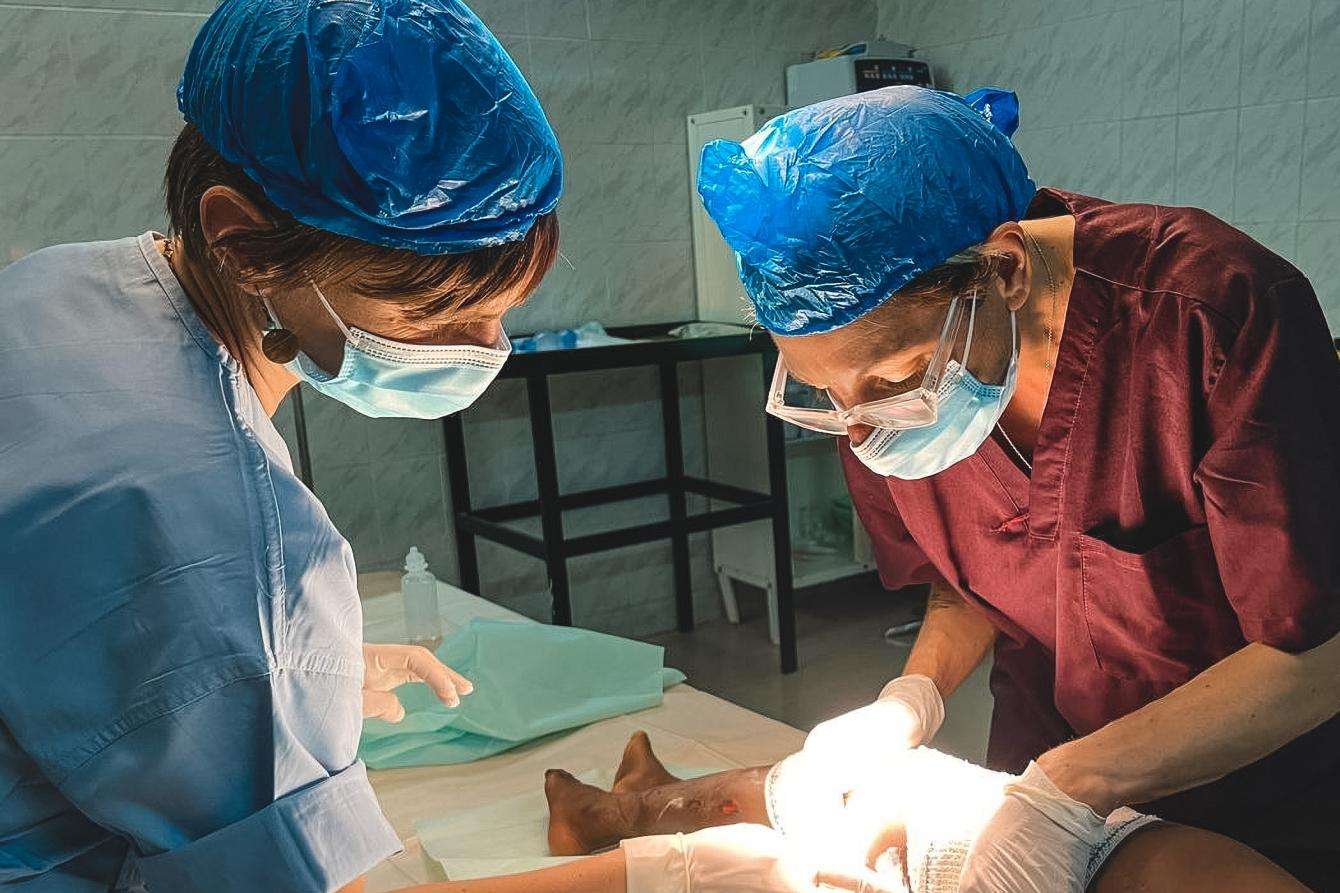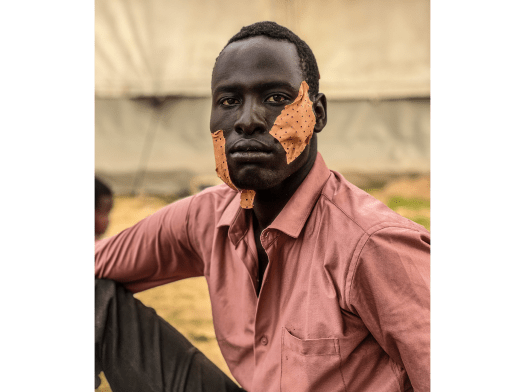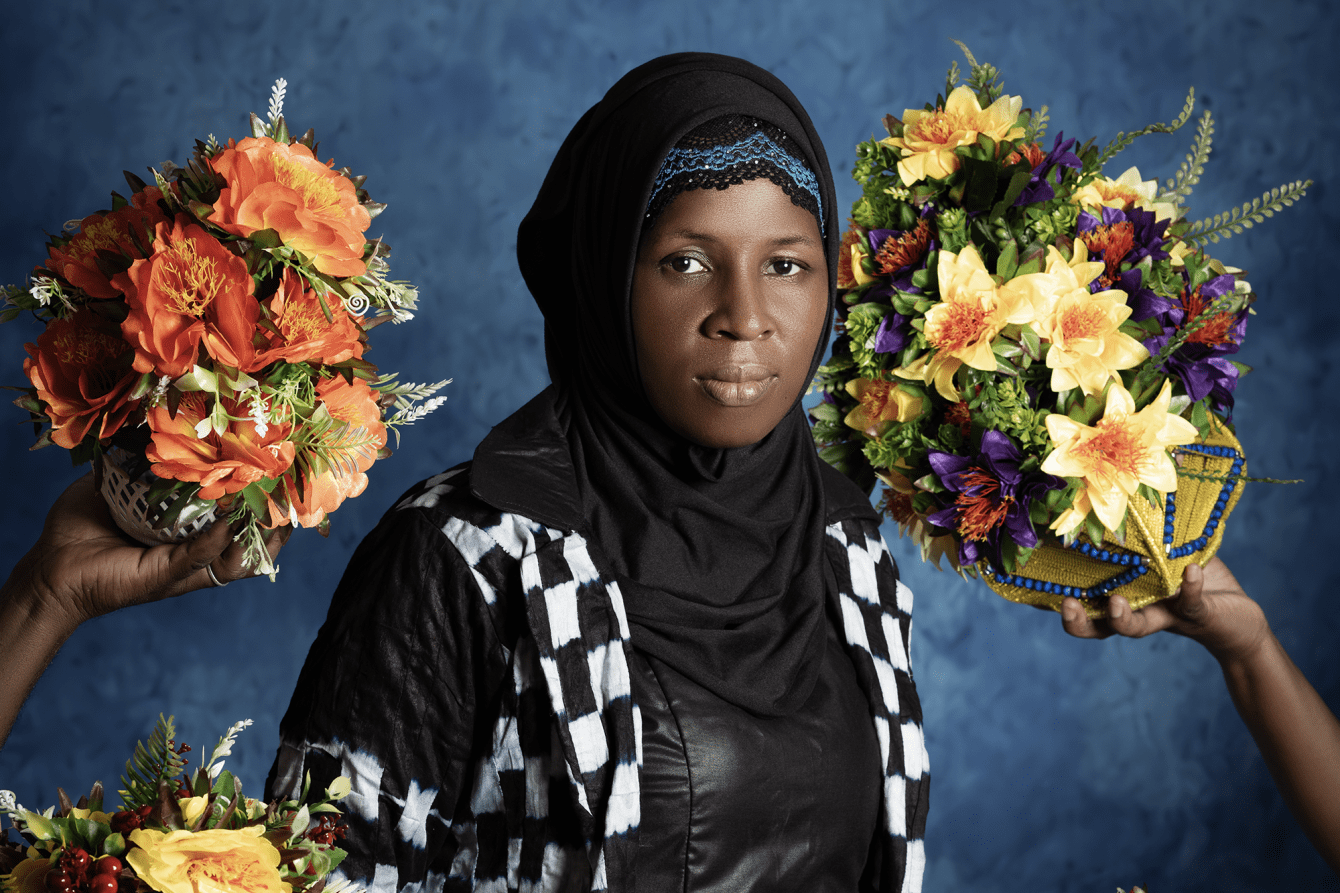Doctors Without Borders/Médecins Sans Frontières (MSF) is responding to emergencies and acute health needs in more than 70 countries.
This year our teams have seen unbearable suffering–from the wars in Gaza, Sudan, and Ukraine, to the impact of earthquakes in Turkey, Syria, and Afghanistan, to the ongoing challenges facing migrants and refugees around the world. They have also witnessed moving scenes that reflect our shared humanity and provide some glimmers of hope in a world that can seem terribly dark.
This collection of photographs provides a look into the lives of people facing crisis and catastrophe–and surviving.

MSF cargo is unloaded from a plane at Rhoe camp, Democratic Republic of Congo (DRC), where around 70,000 internally displaced people live in dire conditions.

“The trans people from my community in general are very, very happy [with MSF] because number one, they have translators in Spanish," said Yuli*, an asylum seeker in Greece. "MSF doctors aren’t interested in whether you are [legally] recognized, if you are an asylum seeker, if you are from Cuba, if you are from Congo. They explain the medical process. They have a lot of patience."

Syrians dig through the rubble left by the catastrophic earthquakes that hit Turkey and northwest Syria on February 6, 2023.

Following the February earthquakes, MSF’s mobile clinics in Syria provided medical care in a temporary shelter camp in the city of Salqin.


A band plays at the reopening of a maternal health clinic in Port-à-Piment, Haiti, which had been destroyed in the 2021 earthquake. MSF rebuilt and upgraded the facility, restoring access to maternal care for 250,000 people in the community.

Siwar, a Syrian refugee, with her insulin pen and her toys in her family's makeshift home in Arsal, northern Lebanon. Siwar was diagnosed with type 1 diabetes at a young age and visits the MSF clinic in town for treatment.

Ukraine 2023 © Laurel Chor/MSF

Ukraine 2023 © Laurel Chor/MSF
Natalia Chorna and Valeriy Chorny allowed MSF to use their home in Posad-Pokrovske, a village in Ukraine’s Kherson region, for consultations in late 2022. We visited them again in 2023. “There was no network, so it was very difficult for us to contact Natalia," said Robin Ehret, MSF project coordinator. Natalia lit tires on fire so the MSF team could find her.

Mauricio works off some energy by boxing at MSF’s treatment center for survivors of extreme violence and torture in Mexico City. Many migrants experience physical and psychological violence in their countries of origin and throughout the migration route through Central America and Mexico, often related to exposure to organized crime.


Türkiye 2023 © Mariana Abdalla/MSF
"There are earthquakes on the one hand and rain on the other. We don’t know what will happen in the future," said Hüseyin, who is from Ören, a town in Malatya, Turkey, which was impacted by earthquakes in early 2023.
"I’m here with my wife, my siblings, my children, and my mother … Our belongings are drowned in water because of the flood, we can't find anything to wear, the neighbor brought us these clothes for now. We were staying in a tent, but the tent got flooded too. We are now trying to dry what we took out of the house, including our family photos. The children are scared. The situation is very dire.”

Central African Republic 2023 © Julien Dewarichet/MSF

Afghan girls walk to school in Band-e-Amir, Bamyan province, a remote area in Afghanistan where MSF opened the only community health facility for women and children. The facility offers prenatal, delivery, and postnatal care, pediatric consultations for children under age five, malnutrition monitoring, and referrals for patients with complicated cases.

After an accident in 2016, Bienvenu (in the pink jersey above) had his right leg amputated. Following the surgery, he received comprehensive medical care and physiotherapy treatment from MSF. Our teams at MSF's SICA trauma surgery hospital in Bangui, CAR, perform operations and provide follow-up care for an average of about 320 people each month.

DRC 2023 © Michel Lunanga/MSF

DRC 2023 © Michel Lunanga/MSF
Viviane Nyirarukundo, 29, fled her village in Masisi territory, DRC, and is raising her two children alone at a camp for displaced people in Goma. She was abandoned by her husband after being raped. Viviane brought one child to MSF’s clinic to be treated for malnutrition, but faces ongoing difficulty finding food for the family.

Beatriz* (far left), a midwife trainee, speaks with colleagues at Chingussura Health Center in Beira, Mozambique, where MSF supports Ministry of Health staff in providing safe abortion care and maternity services. A year ago, when she was still in school, she came to the health center as a patient for safe abortion care.
“I had support from my family, from my husband," she said. "At first, he didn’t accept it, but after we discussed my situation—that I was studying—he accepted it. It is a myth that you cannot get pregnant again after having a [safe] abortion because I got pregnant again normally.”
*Name has been changed

A member of MSF's community outreach team (left) speaks with a patient in an under-resourced neighborhood in Beira, Mozambique. Mobile clinics offer services for hard-to-reach groups including sex workers, vulnerable adolescents, and men who have sex with men.
"People share information, especially among women like me who are in sex work," said Emily*, a sex worker. "We are free, we share all our secrets."
*Name has been changed

Aisha, a six-year-old noma survivor, with her mother Hauwa in the postoperative ward of the Sokoto Noma Hospital in Nigeria. She wants to go to school and become a teacher.
Noma is a preventable disease that destroys the skin and bones of the face, killing about 90 percent of people infected. It most commonly affects children who are malnourished or whose immune systems are otherwise compromised.
In December, the World Health Organization recognized noma as a neglected tropical disease. MSF has been advocating for this recognition and will continue advocacy efforts, including through research and expanding collaboration with academic institutes around the world.

In Sudan this year, fighting broke out between the Sudanese Armed Forces and Rapid Support Forces in Khartoum on April 15 and quickly spread to other regions throughout the country. Pictured above, MSF's surgical and emergency team works alongside local medical staff and volunteers to provide crucial life-saving medical care at Bashair Teaching Hospital in Khartoum.


Chad 2023 © Mohammad Ghannam/MSF

To help accommodate the arrival of large numbers of Sudanese refugees, MSF built an inflatable emergency field hospital to support Adré Hospital. We treated more than 900 wounded people in the space of just four days from June 16 to 19.

An X-ray of a woman who was admitted to Abéché Hospital with a bullet lodged in her neck after fleeing Sudan for Chad. MSF teams are working in four different locations in eastern Chad, providing maternal and surgical care, water and sanitation, and care for people with malnutrition, malaria, and other diseases.

Bangladesh 2023 © Victor Caringal/MSF

Bangladesh 2023 © Victor Caringal/MSF
Left: Rohingya refugee children in Cox’s Bazaar, Bangladesh, create a mural illustrating a kyssa, a Rohingya folktale. The activity aims to reconnect children with their Rohingya identity six years after being forcibly displaced from Myanmar. Right: Habiba, a young Rohingya person, points to a picture she drew of an MSF doctor in a clinic in Bangladesh. She dreams of becoming a doctor to help her community.

An MSF team member sits with a group of newly arrived migrants in Lesvos, Greece. MSF provides emergency assistance—medical and psychological first aid—to people who arrive on the island by boat. In July alone, MSF assisted 1,031 people with emergency medical aid activities, of whom 26 percent were children.


Migrants pray at 5:45 a.m. before embarking on a treacherous journey through the Darién Gap at sunrise.

Nurse Regina Abuk Thor examines two-day-old Amel, held by her mother Catherina Peter Eduat. MSF runs the maternity unit in Aweil State Hospital in Northern Bahr el Ghazal, South Sudan.

“I was married at the age of 13 and my husband passed away sometime after," said Kadiatou Bodié Baldé, president of REGAP+ (Réseau des associations de patients affectés par le VIH) and person living with HIV in Guinea. "For 10 years, I was sick, but I didn’t know what was causing it. No one talked about HIV back then."
"[Later] I found MSF, I found a doctor, and I found community-based organizations that helped me get treatment. The support I received from MSF, my friends, and community-based organizations saved me from feeling traumatized. I found a job and I was able to care for my children.”

Libya 2023 © Ricardo Garcia Vilanova

Views of the devastation caused by floods brought by Storm Daniel, which hit the Libyan coast in September. MSF teams have been providing medical care and mental health support for people impacted, including staff and volunteers.

A group of migrants are among 63 people rescued by the MSF team on board the search and rescue ship Geo Barents. The group is heading to Genova, the place of safety assigned by the Italian authorities following the rescue.

Abdul Salaam, watched by his mother, digs through the rubble of what used to be his home before a series of earthquakes hit Afghanistan in October.

MSF medical teams care for patients affected by the earthquakes in a special tent set up outside Herat Regional Hospital in Afghanistan. Many did not want to be discharged because they had no home to return to.

A Palestinian man drinks water from a spout on October 10, amid wreckage from the Israeli forces' bombardment of the Gaza Strip. The siege of Gaza included cutting off water supplies.

A child rests his head on his father’s shoulder after receiving treatment at Al-Shifa Hospital in Gaza in October.

South Sudan 2023 © Samir Bol

MSF USA Chief Executive Officer Avril Benoît helps carry supplies during a routine childhood vaccination campaign in Wangmok, a village near Old Fangak.
South Sudan 2023 © Samir Bol
While this year's rainy season was not as intense as previous years, the water in Old Fangak, South Sudan, still has not receded. This is partly because the soil isn't able to absorb the water since it remains saturated amid a changing climate, and the river levels are high from stronger rainy seasons elsewhere on the continent. Pictured at right: Avril Benoît, executive director of MSF-USA, helps carry supplies during a routine childhood vaccination campaign in the village of Wangmok, which is only reachable by boat.

“As a psychologist, the most common things I see among children are nightmares, bed-wetting, anxiety, fear,” said Marwa Abu Al Nour, MSF psychologist at Martyrs Clinic in Gaza. “We try as much as possible to give them support via recreational activities. After that, we will work with the mothers through psychosocial education to explain what might happen to them because of the situation and how can they deal with it.”

“Since we arrived at the terminal, after having been through a very violent situation, MSF has taken care of us," said Karol*, a Venezuelan migrant in Mexico. "My daughter was seen by the psychologist, but she's suspicious of everything and still doesn't want to talk. She said 'get me out of here.’”

On December 6, MSF-USA held a vigil at the United Nations calling for a ceasefire and honoring our colleagues killed in Gaza: Alaa Al Shawa, a nurse; Dr. Mahmoud Abunujaila, general practitioner; Mohammed Al Ahel, a laboratory technician; and Dr. Ahmed Al Sahar, general practitioner.




